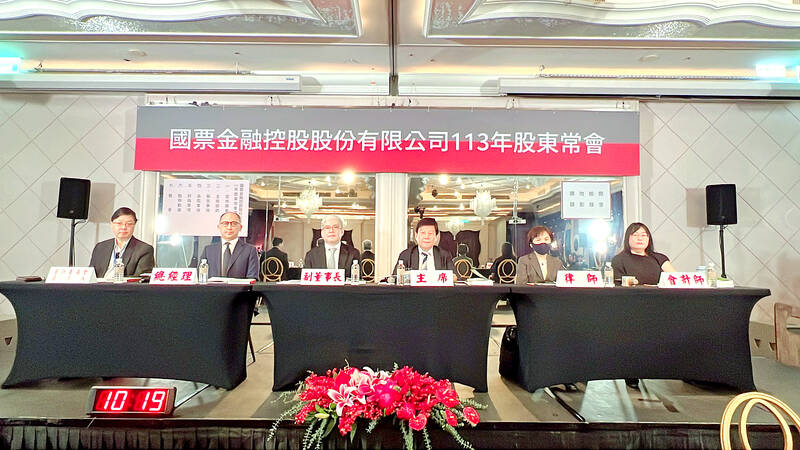IBF Financial Holdings Co (國票金控) yesterday said it is looking at better financial performance ahead, as its securities arm is riding on the TAIEX rallies and its bond holdings would benefit from interest rate cuts by the US Federal Reserve (Fed) later this year.
Its investment in Rakuten International Commercial Bank Co (樂天國際商銀) might also bear fruit faster than expected, after the government allowed online lenders to undertake corporate banking.
The conglomerate shared the views during an online investors’ conference, and its board later approved the distribution of NT$0.73 per share cash dividend on July 15 and a NT$0.246 stock dividend from last year’s net income of NT$2 billion (US$61.6 million), or earnings per share of NT$0.58. Last year’s results suggested a 55 percent spike from a year earlier.

Photo courtesy of IBF Financial Holdings Co
Profitability in the first five months of this year appeared lukewarm at NT$864 million, translating into an earnings per share of NT$0.25, or a tiny 0.28 percent growth from the same period last year, company data showed.
That is because the group’s bond business disappointed, although securities brokering and equities investment put up impressive showings, IBF president Michael Chen (陳冠舟) said.
Stagnant profitability had to do with the central bank’s unexpected interest rate hike in March, which narrowed the interest spread between Taiwan and the US market, Chen said, adding that bond holdings remained weighed by the Fed’s extended restrictive monetary policy.
The situation would brighten moving forward, as the Fed is widely believed to lower interest rates soon, thereby bolstering bond prices, Chen said.
The bond prices have inverse relationships with interest rates.
By contrast, the securities arm saw a 50 percent increase from a year earlier, in terms of commissions, transactions and margin financing, IBF said.
The TAIEX yesterday finished the first half of this year with a 28.4 percent increase to 23,032.25, gathering 5,100 points on the back of capital inflows from investors abroad and at home trying to capitalize on the artificial intelligence (AI) fever.
Taiwanese firms supply AI chips, servers, storage and memory devices.
The group’s bills business also reported a noticeable earnings increase from a year earlier, Chen said.
IBF said it would better leverage its investment in Rakuten Bank, which is to participate in commercial banking, following regulatory permissions.
With a longstanding focus on corporate banking, the conglomerate would lend support and experience to the online bank and speed up its schedule of breaking even, IBF officials said.
At the same time, IBF has set up a leasing subsidiary in hopes of expanding its services to more small and medium-sized enterprises in a more flexible fashion, officials said.
IBF shares ended up 2.22 percent to NT$16.1, higher than the TAIEX’s 0.55 percent rise, Taiwan Stock Exchange data showed.

Sweeping policy changes under US Secretary of Health and Human Services Robert F. Kennedy Jr are having a chilling effect on vaccine makers as anti-vaccine rhetoric has turned into concrete changes in inoculation schedules and recommendations, investors and executives said. The administration of US President Donald Trump has in the past year upended vaccine recommendations, with the country last month ending its longstanding guidance that all children receive inoculations against flu, hepatitis A and other diseases. The unprecedented changes have led to diminished vaccine usage, hurt the investment case for some biotechs, and created a drag that would likely dent revenues and

Global semiconductor stocks advanced yesterday, as comments by Nvidia Corp chief executive officer Jensen Huang (黃仁勳) at Davos, Switzerland, helped reinforce investor enthusiasm for artificial intelligence (AI). Samsung Electronics Co gained as much as 5 percent to an all-time high, helping drive South Korea’s benchmark KOSPI above 5,000 for the first time. That came after the Philadelphia Semiconductor Index rose more than 3 percent to a fresh record on Wednesday, with a boost from Nvidia. The gains came amid broad risk-on trade after US President Donald Trump withdrew his threat of tariffs on some European nations over backing for Greenland. Huang further

Macronix International Co (旺宏), the world’s biggest NOR flash memory supplier, yesterday said it would spend NT$22 billion (US$699.1 million) on capacity expansion this year to increase its production of mid-to-low-density memory chips as the world’s major memorychip suppliers are phasing out the market. The company said its planned capital expenditures are about 11 times higher than the NT$1.8 billion it spent on new facilities and equipment last year. A majority of this year’s outlay would be allocated to step up capacity of multi-level cell (MLC) NAND flash memory chips, which are used in embedded multimedia cards (eMMC), a managed

CULPRITS: Factors that affected the slip included falling global crude oil prices, wait-and-see consumer attitudes due to US tariffs and a different Lunar New Year holiday schedule Taiwan’s retail sales ended a nine-year growth streak last year, slipping 0.2 percent from a year earlier as uncertainty over US tariff policies affected demand for durable goods, data released on Friday by the Ministry of Economic Affairs showed. Last year’s retail sales totaled NT$4.84 trillion (US$153.27 billion), down about NT$9.5 billion, or 0.2 percent, from 2024. Despite the decline, the figure was still the second-highest annual sales total on record. Ministry statistics department deputy head Chen Yu-fang (陳玉芳) said sales of cars, motorcycles and related products, which accounted for 17.4 percent of total retail rales last year, fell NT$68.1 billion, or